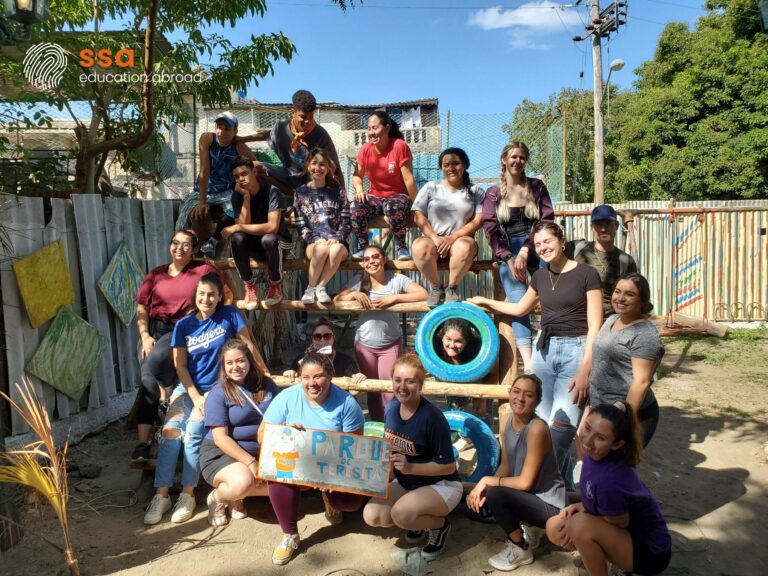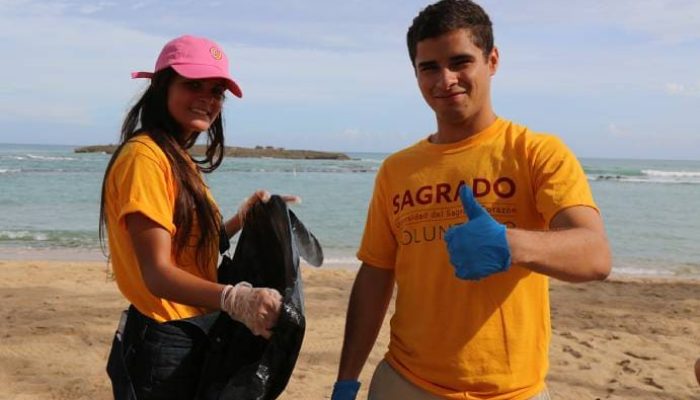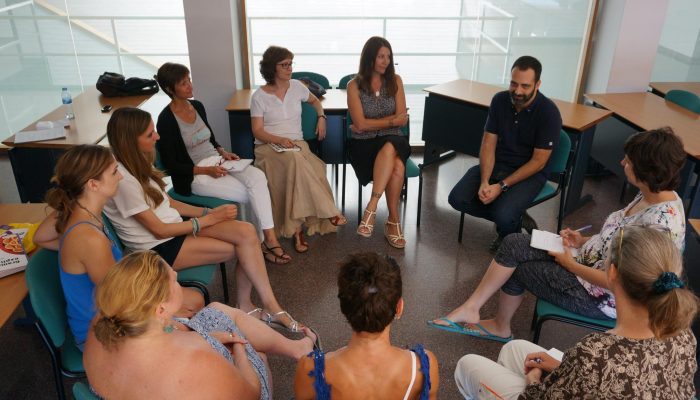Studying abroad in Spain – it’s what tens of thousands of people do every year from all corners of the globe. In this post, we want to give you some practical studying abroad in Spain tips to consider for use at different stages of your experience. We hope that these can save you some money, help your quality of life and make your experience memorable.
- Should I study abroad?
- Best Places to Study Abroad
- Want to study abroad in English? Check out our 13 best places
There is a lot of information to cover – we provide a full manual for our students – so these are just some tips to get you thinking (and researching).
Why do so many people choose to study in Spain?

Spain is one of the oldest civilizations in the world and still has traces of the Roman Empire. The types of historic sites and buildings that you can be around in Spain are eye-opening for North Americans. And Spaniards are generally fun, friendly, and enjoyable to meet.
The famous Spanish lifestyle and idyllic climate make living and learning there a tremendous experience to last a lifetime. So if you’re thinking of being an international student in España, check out these valuable tips.
Before you leave – studying abroad in Spain tips to help you get started and get ready!
How do I decide where I should study in Spain?
The first big decision is where you want to go, and many factors can impact this. If you are a college student, there may be a subset of locations and programs that your school accepts automatically, so start by meeting with your international education office.
Beyond that, consider 1. The program – does it match your needs? 2. The location – does living there appeal to you? Does the climate matter to you? Do you want to be in a big city or close to the water? 3. The cost – is it affordable for your budget? Remember that larger cities such as Madrid and Barcelona tend to have a higher cost of living. Also, check the program’s inclusions to make sure you’re comparing apples and apples. Our programs tend to have almost everything, such as activities and excursions built into the overall cost, while others are more a la carte.
- In-depth article: learning Spanish in Spain
- In-depth article: financial aid and how to pay for your study abroad program
Is studying abroad in Spain expensive? How do I pay for it?
Make a spreadsheet of expected costs so you can save (or raise) what you need ahead of time. Investigate financial aid options at your college and find a program that works within your budget.
Give yourself at least a year to plan and prepare; hopefully, you’ll have a chance to work and save as well as to do some creative fundraising through Gofundme or your local community.
Your budget should also factor in banking fees, as discussed in the next section.
How do I get access to spending money while in Spain?
Once in Spain (and the rest of Europe), your North American cash card should work. However, you should factor in fees. Most banks will charge an international transaction fee of 1% to 3%, and there may be a $2 to $5 ATM withdrawal. All these fees can eat away at your budget, so assume $50 in bank fees or so per month and making fewer but larger withdrawals.
Nerdwallet has some practical tips here as well.
Do you need to know Spanish to study in Spain?

Even if you’re studying in Spain on a language immersion course because your skill level is not as high as you need, we recommend you gain as much knowledge of the language before you go – particularly Spanish from Spain. The more you know before arrival, the better chances you have to experience a significant “lift-off” with your proficiency.
Knowing as much of the basics as possible can help your adjustment in the first weeks you’re there. There are regional and national differences with any language, so we recommend not just studying vocabulary and key phrases but ensuring you review terminology and pronunciation from SPAIN.
Taking classes at your college is the most obvious way to prepare your language. There are many online resources, such as this beginner video of essential words. Learning every-day words related to travel, shopping and eating will help you in those first weeks.
Also, don’t forget you can take some study programs entirely in English.
How do I find cheap flights?
Finding the right airfare can save you hundreds of dollars, which can be applied to adventures in other parts of Spain or Europe. Or good restaurants.
Four excellent steps:
- Start long in advance to research (of course, you need to know the key dates that you’ll travel)
- Use online tools that compare multiple airlines such as Kayak, Skyscanner, and Orbitz
- Be flexible: you can often save money through slightly unusual routing and more layovers; sometimes, airlines will reward you by helping to fill legs that are not so full. Maybe you go through Brussels, Belgium first. If you’re young and can handle a long travel day to Europe, you can save on airfare. And finally;
- If your schedule allows, fly during the middle part of the week for cheaper flights.
What to pack for living in Spain?
Like on any long trip, packing can be a challenge, especially since this is probably a new culture for you. Check out what we wrote on packing for studying in beautiful Barcelona in this post. Start by checking out the average temperatures by month for the time that you’ll be in Spain. Keep in mind that, although Spaniards have become more casual over recent decades, they remain a bit more formal in their dress than Americans.
Despite this, international students don’t have many reasons to wear a lot of formal clothing during a semester, so limit it to an outfit or two. Nowadays, some excellent synthetic fabrics don’t take up much room in a suitcase but are mostly wrinkle resistant. These can be great for a semester program in which you hope to take some weekend trips to other regions or countries in Europe. For cooler weather, think layers instead of large, bulky coats.
Jeans are very common in Spain, as in North America, and can be dressed up or dressed down, so having several pairs can be useful. Footwear is also an important consideration – you’ll be doing a lot of walking and probably riding public transportation so think of shoes that can handle public spaces and cobblestone streets. If you plan to do some running, take a good pair of shoes for that (they’re generally cheaper in the USA).
If you need prescription medication, it is best to take enough for the entire time that you will be in Spain to avoid complications in getting renewals.
What about a passport and a visa?
We know that you know you need a passport for international travel. If you don’t have one, it can take several months, so get started getting documents together and download the application form. If you have one, make sure it will be valid for a full six months after your planned return to the USA.
Do you need a visa? For Americans and Canadians, this all comes down to your planned length of stay. If your study abroad program is under 90 days, you can travel with just a passport. However, if you are doing a full academic semester or year, you will need a student visa before you depart. In the USA, there are various Spanish consulates, and their exact procedures vary between them. You must apply through the consulate that corresponds to your address, so check out Spain’s consular services here.
How can you have the best experience in Spain? Some tips.
Once you get to Spain, how do you ensure you have a memorable experience? Live the language, experience the culture, be smart with your money and make lots of friends. Easier said than done, right? Let’s break that down into some practical tips.
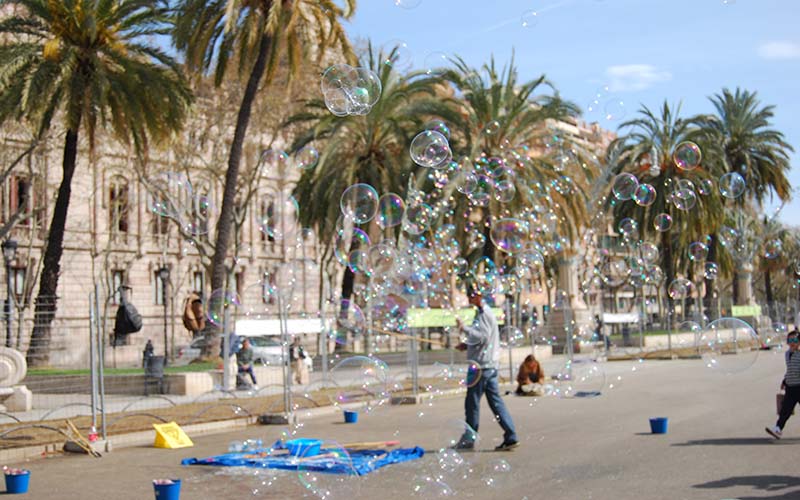
How do I stay connected? Wifi and a Spanish phone plan
Best practices for telephone usage have significantly evolved. Now there are plans that you can buy at a reasonable price after arrival in Spain. Buy a “Sim” card that goes with a monthly plan for set amounts of data and minutes of use. You won’t need much data because you can use these phones to text with your local friend.
Send larger files once you are on wifi. You can get a plan for under 20 Euros per month without a long-term commitment (unlimited local calls and 5 to 10 gigabytes of data). Once you arrive, check out Pepephone and O2 as options.
Whatsapp is not used as much in the USA but get your friends and family to add it to their phones; you’ll be able to communicate with them easily when you’re on wifi, including FREE telephone calls.
That said, don’t spend your study abroad experience on your phone. There’s too much to see in Spain.
Is Spain a safe country?
No place is entirely without risk, but Spanish cities have much lower violent crime rates than you’ll find in the USA. With common sense and keeping your eyes open, you’ll be at less risk of petty crime.
What do we advise? Put your phone down and watch where you’re going. Females should be accompanied at night. Don’t accept drinks from strangers – only get them directly from an employee.
Ask locals where the “dodgy” areas can be, and then avoid those unless you’re passing through in a large group. Look around before and after using an ATM. Keep in mind that in Europe, in the most famous touristic sites, there sometimes are people looking to target visitors for crimes of opportunity – pickpocketing, snatching phones, grabbing gold necklaces, etc. Being alert and putting things out of reach can reduce your chances significantly.
Don’t live in fear in Spain – be the person who lives out great experiences.
Where should I live?
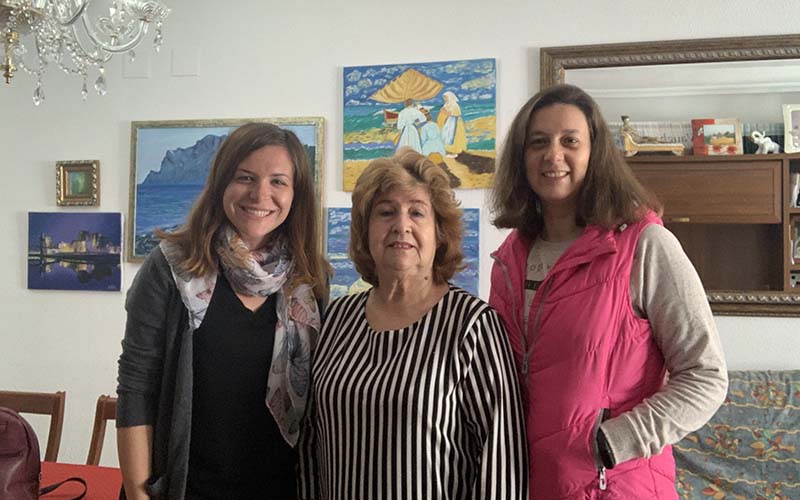
Live with Spaniards! Or at least other international students.
It’s easy to fall into a bubble with other American students (or whatever your nationality), and you may make friendships with them that last a lifetime. But to get the most out of your time in Spain, we recommend you live with a host family or in a student residence with Spaniards – try to make as many Spanish friends as possible!
Meeting people in another country takes time and something to trigger that. Homestay families are a great start as you practice Castilian Spanish over meals and get cultural tips. They may also have friends and relatives closer to your age who can show you around.
If you’re in a student residence, you have young people right there to mingle with. Sometimes it takes some energy on your part – propose exchanging English and Spanish practice. Or offer to buy them a coffee and a pastry to practice your Spanish. Start kicking a soccer ball around outside the residence. You need an icebreaker; making friendships over cultural and language differences only takes a little patience, understanding, and friendliness.
How do I meet people in Spain?
Do the same things you do at home! That seems like strange advice; our point is that your hobby/affinity/passion at home can be a way to meet people in Spain. And now, through websites, you can find “meet-ups” of stamp collectors, hikers, art enthusiasts, gamers — whatever you’re into.
You can be the American basketball player at the outdoor courts. Are you a trained soccer player from North America? That would be a novelty for them. There are groups to volunteer to practice English with locals. So use what you love to meet people with the same interest and share what you know with them. They’ll welcome you.
Go to the same places
It may seem counterintuitive; what we mean is that if you frequent the same cafes, restaurants, and pubs semi-regularly, you start to see the same faces.
These may be workers or their regular crowd. It’s a great technique to break down barriers and start meeting locals. Don’t overlook the fun of meeting someone much older with years of great stories that loves to chat. Sometimes you can find that person at your local coffee place in Alicante or wherever you’re studying.
What do I need to know about tipping at restaurants and cafes?
Ask experienced world travelers – this is often a confusing issue, so be ready. You don’t want to be a rude guest in your new country.
The good news is that the tipping culture is not as elaborate as it is in North America. Tips are considered “extras” as opposed to a necessity for making an adequate income. So the first thing is that in Spain, gratuities are left in cash and not added to your bill (there may be some exceptions in very high-end restaurants). And 5% is the high side of the tipping range if the service has been excellent. If the server is slow and brusque, you don’t have to leave anything.



